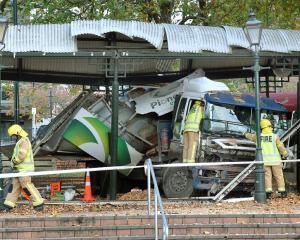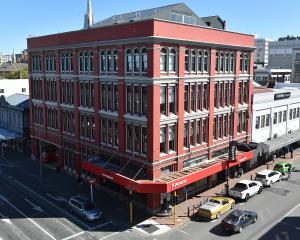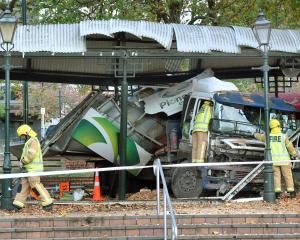The Dunedin City Council has settled on a 4% rates rise after opting to invest more than $1 million in projects expected to generate millions more in savings over time.
Dunedin Mayor Dave Cull told the Otago Daily Times the decision would see the council trim millions from its debt servicing and other costs in the coming years, as well as easing pressure on rates.
''I think it's very significant ... it will certainly have a significant impact on our requirement to rate,'' he said.
However, the decision came only after a last-minute question yesterday over whether councillors should instead consider reinstating the budgets of other major projects trimmed in the council's cost-saving drive.
The call came from Cr Bill Acklin as councillors at yesterday's 2013-14 draft annual plan meeting were presented with final savings identified by council staff totalling $1.41 million.
The savings came from a mixture of budget cuts and carry-forwards across the council operation, after councillors directed council chief executive Paul Orders to find ways to run a leaner ship.
Resulting savings, if unspent, could have dropped the rates increase for the coming financial year to 3.2%, well below the 4% forecast earlier in the year.
However, Mr Cull had already signalled a desire to use the extra savings to further reduce the council's debt, either by accelerating debt repayments or spending the money on planned projects that were otherwise to be funded with borrowings.
Councillors agreed with the ''invest-to-save'' approach yesterday, opting to spend $1.1 million to bring forward the planned implementation of radio frequency identification (RFID) technology in Dunedin's public libraries.
The move would avoid the need to borrow the money to fund the project, as planned, as part of a wider libraries upgrade in 2016-17.
The change meant the council would save $180,000 a year in staff costs, reducing through natural attrition, from 2014-15, council city strategy and development general manager Sue Bidrose said.
That annual saving would increase to $280,000 a year from 2016-17, at which point debt-servicing costs would also be avoided, Dr Bidrose said.
The remaining savings would be invested in a planned lighting upgrade for the Civic Centre and Central Library buildings, which would attract a subsidy of up to 40% from the Energy Efficiency and Conservation Authority. That was expected to save at least another $100,000 a year, cutting energy use, maintenance and other operating costs from 2014-15. The ''conservative'' estimates meant savings could be double that.
The $1.41 million had come partly from changes to roading contracts, as well as unspent budget carry-forwards and one-off savings, councillors heard.
Together, the return on the savings investments would total $3.15 million in the years to 2022-23, council projections estimated.
That was on top of earlier decisions to accelerate stadium debt repayments by $1.7 million, which were included in the draft budget and would trim $25 million from interest costs over the life of the loans.
Most councillors at yesterday's meeting spoke in support of the targeted spending, while Mr Cull said the projects would deliver extra value on top of savings.
However, Cr Acklin, community development committee chairman, questioned the spending, when projects such as the planned upgrade of Logan Park and other sports fields had been ''left in limbo'' by earlier budget cuts. The cuts would come back to haunt the council when deteriorating sports grounds required extra spending ''all of a sudden'', he warned.
Mr Cull said the changes had been subjected to the annual plan consultation process in the past, and approved, while Mr Orders said council staff were under instruction to deliver savings, and would not bring forward projects that did not do that.
However, council operations general manager Tony Avery said a wider review of sports ground needs across the city had been launched, and results would be available in time for next year's annual plan.
The council would meet on June 17 to adopt the annual plan and confirm rates, which would come into effect on July 1.












